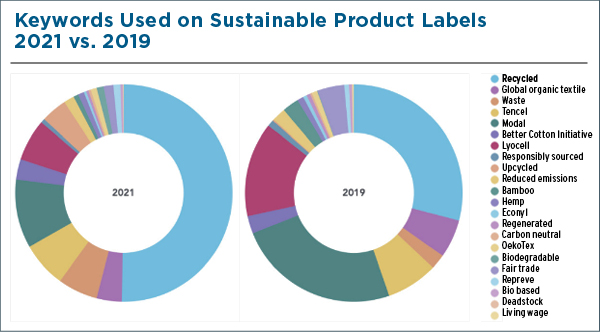Sustainability is more important than ever as fashion supply chains become more environmentally conscious, says a report from intelligence platform Edited. The biggest shift has been the number of products labeled "recycled" or "containing recycled materials" (see chart), which now account for 51% of sustainable products versus 29% in 2019. Highlights from the report reveal:

- Move away from cotton. The fashion supply chain's overreliance on cotton has led to environmental impacts with natural resources at stake. Retailers must look beyond conventional materials to create more responsible garments. Products containing Better Cotton Initiative cotton have increased 190% in the United States compared to 2019.
- Repurpose unsold inventory. This will be critical in managing waste amid post-pandemic purchasing and discarding. With backing from Gen Z, the secondhand market is predicted to be valued at $64 billion by 2024.
- Look beyond apparel. Working from home has led to upgraded home spaces, with 97% of consumers interested in buying environmentally friendly home furnishings. If the cost and style were comparable, 87% of respondents would be willing to pay more, creating visible demand for sustainable products across every retail category.
- Education is imperative. To encourage consumers to dispose of clothing with the planet in mind, retailers need to provide education and incentives to recycle or return used goods to improve circularity. 72% of U.S. consumers are aware of environmental issues in fashion, but 42% are confused about what makes a garment sustainable.
- Tighten sustainability timelines. What companies do in the next five to 10 years will be critical. To achieve net-zero emissions, retailers need to revamp their processes at every point in the value chain, not just offset emissions.



